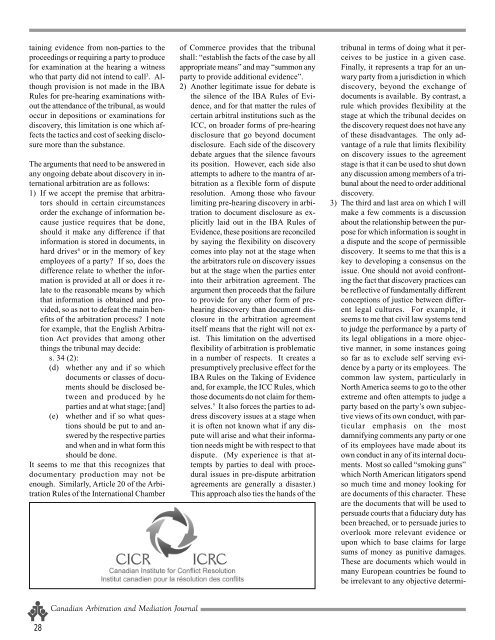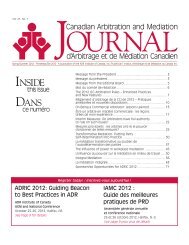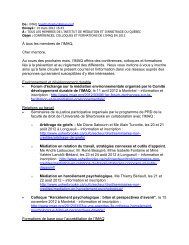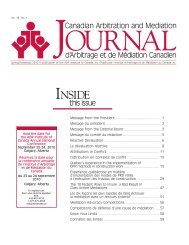taining evidence from non-parties to theproceedings or requiring a party to producefor examination at the hearing a witnesswho that party did not intend to call 3 . Althoughprovision is not made in the IBARules for pre-hearing examinations withoutthe attendance <strong>of</strong> the tribunal, as wouldoccur in depositions or examinations fordiscovery, this limitation is one which affectsthe tactics and cost <strong>of</strong> seeking disclosuremore than the substance.The arguments that need to be answered inany ongoing debate about discovery in internationalarbitration are as follows:1) If we accept the premise that arbitratorsshould in certain circumstancesorder the exchange <strong>of</strong> information becausejustice requires that be done,should it make any difference if thatinformation is stored in documents, inhard drives 4 or in the memory <strong>of</strong> keyemployees <strong>of</strong> a party? If so, does thedifference relate to whether the informationis provided at all or does it relateto the reasonable means by whichthat information is obtained and provided,so as not to defeat the main benefits<strong>of</strong> the arbitration process? I notefor example, that the English ArbitrationAct provides that among otherthings the tribunal may decide:s. 34 (2):(d) whether any and if so whichdocuments or classes <strong>of</strong> documentsshould be disclosed betweenand produced by he(e)parties and at what stage; [and]whether and if so what questionsshould be put to and answeredby the respective partiesand when and in what form thisshould be done.It seems to me that this recognizes thatdocumentary production may not beenough. Similarly, Article 20 <strong>of</strong> the ArbitrationRules <strong>of</strong> the International Chamber<strong>of</strong> Commerce provides that the tribunalshall: “establish the facts <strong>of</strong> the case by allappropriate means” and may “summon anyparty to provide additional evidence”.2) Another legitimate issue for debate isthe silence <strong>of</strong> the IBA Rules <strong>of</strong> Evidence,and for that matter the rules <strong>of</strong>certain arbitral institutions such as theICC, on broader forms <strong>of</strong> pre-hearingdisclosure that go beyond documentdisclosure. Each side <strong>of</strong> the discoverydebate argues that the silence favoursits position. However, each side alsoattempts to adhere to the mantra <strong>of</strong> arbitrationas a flexible form <strong>of</strong> disputeresolution. Among those who favourlimiting pre-hearing discovery in arbitrationto document disclosure as explicitlylaid out in the IBA Rules <strong>of</strong>Evidence, these positions are reconciledby saying the flexibility on discoverycomes into play not at the stage whenthe arbitrators rule on discovery issuesbut at the stage when the parties enterinto their arbitration agreement. Theargument then proceeds that the failureto provide for any other form <strong>of</strong> prehearingdiscovery than document disclosurein the arbitration agreementitself means that the right will not exist.This limitation on the advertisedflexibility <strong>of</strong> arbitration is problematicin a number <strong>of</strong> respects. It creates apresumptively preclusive effect for theIBA Rules on the Taking <strong>of</strong> Evidenceand, for example, the ICC Rules, whichthose documents do not claim for themselves.5 It also forces the parties to addressdiscovery issues at a stage whenit is <strong>of</strong>ten not known what if any disputewill arise and what their informationneeds might be with respect to thatdispute. (My experience is that attemptsby parties to deal with proceduralissues in pre-dispute arbitrationagreements are generally a disaster.)This approach also ties the hands <strong>of</strong> thetribunal in terms <strong>of</strong> doing what it perceivesto be justice in a given case.Finally, it represents a trap for an unwaryparty from a jurisdiction in whichdiscovery, beyond the exchange <strong>of</strong>documents is available. By contrast, arule which provides flexibility at thestage at which the tribunal decides onthe discovery request does not have any<strong>of</strong> these disadvantages. The only advantage<strong>of</strong> a rule that limits flexibilityon discovery issues to the agreementstage is that it can be used to shut downany discussion among members <strong>of</strong> a tribunalabout the need to order additionaldiscovery.3) The third and last area on which I willmake a few comments is a discussionabout the relationship between the purposefor which information is sought ina dispute and the scope <strong>of</strong> permissiblediscovery. It seems to me that this is akey to developing a consensus on theissue. One should not avoid confrontingthe fact that discovery practices canbe reflective <strong>of</strong> fundamentally differentconceptions <strong>of</strong> justice between differentlegal cultures. For example, itseems to me that civil law systems tendto judge the performance by a party <strong>of</strong>its legal obligations in a more objectivemanner, in some instances goingso far as to exclude self serving evidenceby a party or its employees. Thecommon law system, particularly inNorth America seems to go to the otherextreme and <strong>of</strong>ten attempts to judge aparty based on the party’s own subjectiveviews <strong>of</strong> its own conduct, with particularemphasis on the mostdamnifying comments any party or one<strong>of</strong> its employees have made about itsown conduct in any <strong>of</strong> its internal documents.Most so called “smoking guns”which North American litigators spendso much time and money looking forare documents <strong>of</strong> this character. Theseare the documents that will be used topersuade courts that a fiduciary duty hasbeen breached, or to persuade juries tooverlook more relevant evidence orupon which to base claims for largesums <strong>of</strong> money as punitive damages.These are documents which would inmany European countries be found tobe irrelevant to any objective determi-Canadian Arbitration and Mediation Journal28
nation <strong>of</strong> the rights and obligations <strong>of</strong>the parties. It is fair to say that manybusinesses look to arbitration to savethemselves from these excesses. In myview, the desired approach is succinctlyand wisely stated in the Rule 11 <strong>of</strong> theRules for Non-Administered Arbitrationpromulgated by the Centre for PublicResources in the United States whichprovides:The Tribunal may require andfacilitate such disclosure as itshall determine is appropriatein the circumstances, takinginto account the needs <strong>of</strong> theparties and the desirability <strong>of</strong>making disclosure expeditiousand cost-effective.Ultimately, the success <strong>of</strong> international arbitrationwill be judged by its ability to savebusiness from the North American litigationprocess while still preserving the flexibilityto do justice in the individual case.In this sense the Guidelines for ArbitratorsConcerning the Exchanges <strong>of</strong> Informationwhich have been published by the AmericanArbitration Association and its internationalarm the International Centre forDispute resolution correctly express a consensusview (at least from a North Americanperspective):a. Arbitrators should be receptive to creativesolutions for achieving exchanges<strong>of</strong> information in ways that avoid costsand delay, consistent with the principles<strong>of</strong> due process expressed in theseGuidelines.b. Depositions, interrogatories, and requeststo admit, as developed in Americancourt procedures, are generally notappropriate procedures for obtaininginformation in international arbitration.[Emphasis added.]It is vital that arbitration experts confrontthe challenge <strong>of</strong> discovery by engaging inopen and constructive discussions abouthow to achieve the objective <strong>of</strong> establishingthe facts that are needed to achieve ajust result while maintaining the efficienciesthat distinguish arbitration from litigationbefore the courts.1Independent arbitrator <strong>of</strong> business disputes based in Toronto, <strong>Canada</strong>. Seewww.wghlaw.com. This is the updated, edited text <strong>of</strong> a presentation made to a private lawfirm seminar on international arbitration in London, England.2For a discussion <strong>of</strong> this exchange see “Spoliation in International Arbitration: Is it TimetoReconsider the ‘Dirty Wars’ <strong>of</strong> the International Arbitral Process?” by Steven A. ammond,IBA Dispute Resolution International March 2009.3See the new Rules IBA Rules <strong>of</strong> Evidence: Article 3(9) and Article 4(9) and (10).4It is noteworthy that the new IBA Rules on the Taking <strong>of</strong> Evidence in International Arbitrationnow explicitly recognize that “documents” are no less subject to production becausethey are in electronic form. Article 3(12)(b) provides: “Documents that a Partymaintains in electronic form shall be submitted or produced in the form most convenientor economical to it that is reasonably usable by the recipients, unless the Parties agreeotherwise or, in the absence <strong>of</strong> such agreement, the Arbitral Tribunal decides otherwise.”While, apparently for ongoing political reasons, this continues to be represented by influentialcommentators as an attitude <strong>of</strong> “agnosticism” towards e-discovery (see Andre deAlbuquerque Cavalcanti Abbud, The IBA Rules on the Taking <strong>of</strong> Evidence in InternationalArbitration: a presentation <strong>of</strong> the 2010 revised text.) it is submitted that the equation <strong>of</strong>electronic documents to other forms <strong>of</strong> documents resolves the issue <strong>of</strong> principle in favour<strong>of</strong> disclosure and limits on-going discussion to a question <strong>of</strong> the means most appropriateto the electronic storage and retrieval <strong>of</strong> documents.5See the Preamble to the IBA Rules <strong>of</strong> Evidence which state in part: “The Rules are notintended to limit the flexibility that is inherent in, and an advantage <strong>of</strong>, international arbitration,and Parties and Arbitral Tribunals are free to adapt them to the particular circumstances<strong>of</strong> each arbitration.” [Emphasis added.]L’utilisation de la Discovery dans l’arbitrage internationalWilliam G. Horton, Arb. A, FCIArb 1À mesure que l’arbitrage internationalétend son champ d’action et se généraliseen tant que méthode de résolution des différendscommerciaux transfrontaliers, ilmet forcément en contact des cultures etdes normes juridiques différentes. Commedans le cas de la collision entre les plaquescontinentales, les points de contact demeurentvisibles longtemps après la fusion desplaques tectoniques , comme en témoignentles hautes chaînes de montagne et les zonesd’instabilité. En arbitrage international,la pratique connue en Amérique du Nordsous le nom de Discovery (que nous appelleronsici la « communication de lapreuve ») représente l’un de ces points decontact entre cultures différentes.La question que j’aimerais aborder n’estpas tant la communication de la preuve entant que telle, mais bien la façon dont elleest traitée par les experts en arbitrage.Malheureusement, une grande part du débatest imprégnée de plaidoiries partisaneset de machinations rhétoriques dont le seulbut est de faire dévier la discussion en faveurde l’un ou de l’autre point de vue. Ils’agit, en partie, d’un phénomène inconscient,intrinsèque à tout dialogue entre êtreshumains en général. Mais une autre partiede cette pratique semble motivée par undésir conscient de privilégier un systèmed’arbitrage en particulier, celui auquell’orateur est associé. Selon moi, cette dériveva à l’encontre de la croissance et dudéveloppement de cette institution qu’estl’arbitrage international et doit en être exclue.Un grand nombre des points que j’aborderaidans le présent article se fondent surles questions soulevées dans la centaine decourriels échangés sur le serveur de listede l’IBA Arbitration Committee, à la suited’un article que son auteur a eu la hardiessede faire circuler sur l’utilisation de lapreuve électronique pendant le procès etdans lequel il affirmait qu’une grande partiedes questions qu’il abordait se posaientégalement en arbitrage international. Laréaction immédiate fut d’affirmer que l’administrationde la preuve électronique neprésentait aucune pertinence pour l’arbitrageinternational puisque le terme« discovery » n’a absolument rien à voiravec l’arbitrage international et appartientà un système de règlement des litiges exclusifà l’Amérique du Nord. 2 Cette discussiona ouvert les vannes à un véritabledéluge d’opinions, dont celles de nombreux« grands noms » de l’arbitrage. Il convientde préciser que l’opinion majoritaire s’estprononcée plutôt massivement contre lacommunication de la preuve en général, etde la preuve électronique en particulier.Au nombre des premiers commentairesformulés sur le serveur de liste, il y a lieude mentionner le suivant : à la base du problèmeréside le fait qu’il n’existe aucunedéfinition claire ou unanimement reconnuedu terme discovery. En effet, dans le contextejudiciaire nord-américain, le termeLe Journal canadien d'arbitrage et de médiation29







